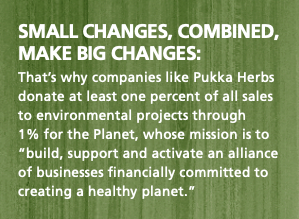June 6, 2019

Sponsored Content
So how does a company practice sustainability? It requires addressing all aspects of the business from raw material to finished products and packaging. It’s about considering sustainable agriculture practices to combat climate change, and ensuring practices are in place that are “good for the planet.”
“I think there are basic things every company should be doing, recycling and putting more energy efficient systems in place. The reality is there is an investment that pays off. There is real ROI to use more energy efficient equipment,” says Luke Vernon, managing partner, Ridgeline Ventures, a venture investment firm in natural foods and other sectors that helps people live healthier lives. “Without a meaningful change on where the climate is heading, we are in for some pretty serious consequences based on carbon levels today in the atmosphere.” Likewise, he says companies need to address water depletion and cleanliness and work to incorporate practices that don’t deplete water sources.
Packaging is another one of the more challenging problems when it comes to creating a sustainable product. “We have to get rid of plastics, we have to come up with an alternative degradable material. It doesn’t take a genius to realize what is happening here with garbage. Most of it is plastic packaging,” says Sheldon Romer, executive consultant and co-founder/former CEO of Rudi’s Organic Bakery. Every change counts. Unilever’s “less, better and no plastics” strategy has led to approximately 70% of the Unilever portfolio being recyclable in North America.
Animal welfare and care is another factor. From eggs to chickens, cows and pigs, animals and how they are raised and treated are all a part of the sustainability equation. That’s why companies such as Sir Kensington’s choose to only use certified humane, free-range eggs in their products. And, by 2024, 100% of chicken, beef and pork in Knorr will meet higher animal welfare standards equating to Global Animal Partnership (GAP) Step® rating 2. This means no cages, no crates, no crowding and an enriched environment in which to live.
 The climate is on everyone’s mind, and companies are finding ways to address one of the most important issues threatening our planet today. Unilever’s goal is to halve the environmental footprint of the making and use of the company’s products by 2030. The Pukka Herbs team is able to map the company’s carbon footprint, breaking down its total carbon output from ‘crop to cup.' Now, Pukka has set an ambitious climate goal—to be carbon zero by 2030—which was independently validated by the Science Based Targets initiative at the end of 2018.
The climate is on everyone’s mind, and companies are finding ways to address one of the most important issues threatening our planet today. Unilever’s goal is to halve the environmental footprint of the making and use of the company’s products by 2030. The Pukka Herbs team is able to map the company’s carbon footprint, breaking down its total carbon output from ‘crop to cup.' Now, Pukka has set an ambitious climate goal—to be carbon zero by 2030—which was independently validated by the Science Based Targets initiative at the end of 2018.
Organic, too, is becoming an increasingly important part of the conversation. While demand for organic continues to grow, organic acreage in North America is still less than 1% of farmland. “What I see with regard to organic is the demand is outstripping supply and that is a real problem, and on top of that you have fewer [young] people who want to be farmers. So, there is a serious issue there, and while it is an issue, it’s also a massive opportunity for larger companies who can help to secure that supply,” Vernon says.
Supporting organic is a key initiative for the future and the health of the planet. Hand-in-hand with organic is supporting soil health and sustainable agriculture. Unilever is working toward sourcing more and more organic raw ingredients to support organic supply chains and organic farmers. Project Gigaton is another initiative and aims to plant 15 million acres of cover crops in partnership with other organizations to promote regenerative soil and sustainable farming.
The solution is here, and not only is it attainable, but it’s a solution being embraced across the nation because of the power of our collective voice.
You May Also Like
.png?width=700&auto=webp&quality=80&disable=upscale)


